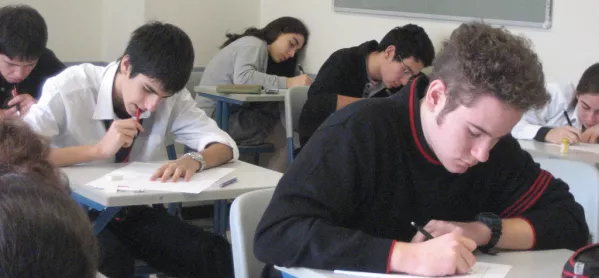The president of the Royal Society is calling for an independent review of post-16 education in the UK.
Venki Ramakrishnan says A levels are outdated and do not give young people the best start for getting good jobs.
He wants a review during the next parliament, with a view to transforming school curricula within the next decade.
Read: Scrap GCSEs, says Robert Halfon
Read: GCSEs now ‘redundant’, says Lord Baker
Comment: ‘End this addiction to high-stakes exams’
In a speech at the Royal Society Business Forum today, Mr Ramakrishnan will say that “endless tinkering with elements of the system has left many people tired of, and sceptical about, calls for change”.
According to the Royal Society, the world’s oldest scientific academy, in the coming years four out of five businesses are expected to increase the number of high-skilled roles.
A levels ‘don’t provide 21st-century skills’
But two-thirds are concerned about a lack of sufficiently skilled people to fill the positions.
Preliminary research by the society suggests that parents want change, too, with more than half believing that young people should be encouraged to study a broader range of subjects than they currently do.
Mr Ramakrishnan is expected to criticise A levels as being too narrow in scope since they were first introduced in 1951.
He will say they are not fit for purpose and do not equip young people with the skills they need in the 21st-century workplace.
Research commissioned by the Royal Society puts the average number of A levels per student at 2.7, raising concerns about whether young people are leaving school with the broad range of skills needed for the modern workplace.
Mr Ramakrishnan will say: “If we want our young people to be able to get good jobs and employers to be able to hire the people they need in the future, we need to make sure our schools and colleges are teaching the skills that will be needed.
“A levels are not doing that.
“The jobs market has always changed but we are facing a new wave of change driven by technologies such as artificial intelligence.
“Some jobs will change, some will be lost altogether and there will be many new jobs in industries that don’t even exist yet.”
While acknowledging that some schools do a good job at providing a broader curriculum, the Royal Society president will say that “pockets of success for the wealthy elite are not good enough”.
Mr Ramakrishnan’s comments follow those of Robert Halfon, the Conservative chair of the House of Commons Education Select Committee, who yesterday called for GCSEs to be scrapped and A levels replaced with a “baccalaureate” that recognises both the academic and vocational sides of education.
His call to abolish GCSEs was backed by the NEU teaching union, and former Conservative education secretary Lord Baker, who said the qualification was “redundant” and should be “quietly put to sleep”.
A DfE spokesperson said: “Our world class A levels were designed with direct input from subject experts and universities to ensure young people leave school with the knowledge and skills they need to go on to higher education or get job.”
She added that A levels are not the only option for young people post-16, citing “our new high-quality apprenticeships developed directly with employers so that young people gain the skills they demand”, and the new T levels - the technical equivalent of A levels, being introduced from September 2020.




